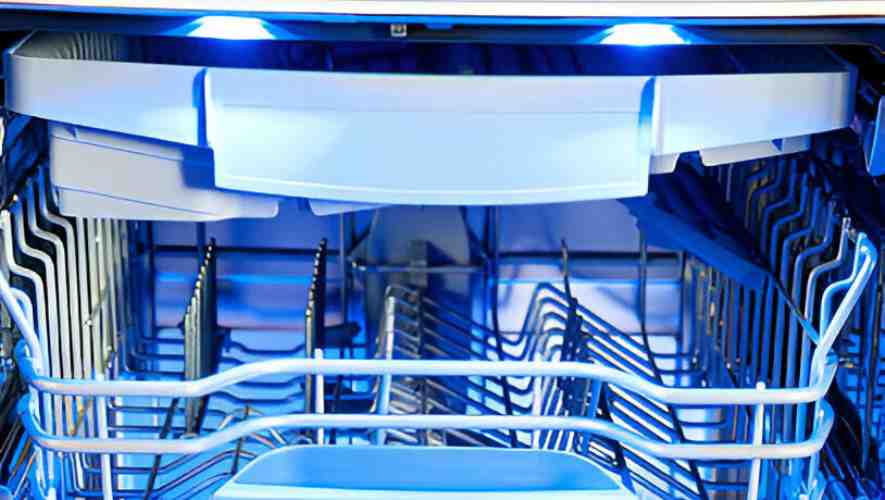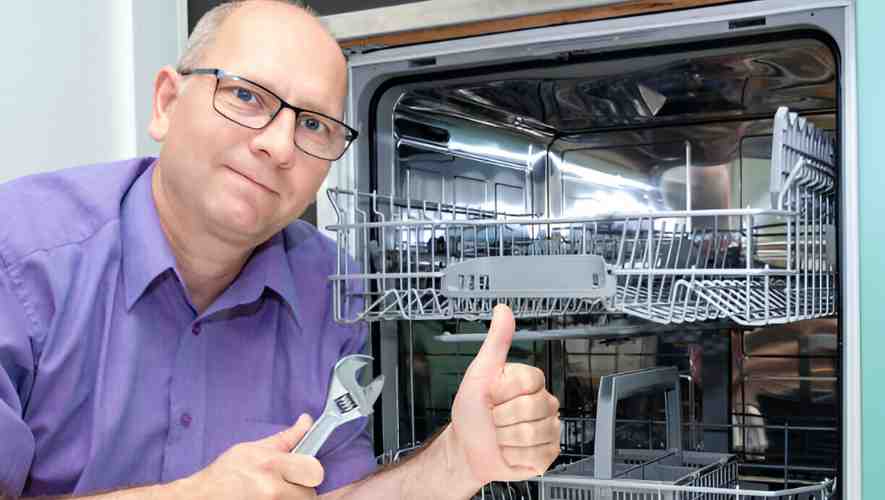Hey y’all, if you’ve been scratching your head wondering why your GE dishwasher ain’t starting and just keeps beeping at you, you’re not alone. It’s like it’s trying to talk but only knows one word—beep! This can be super annoying, especially when you see all those flashing lights blinking like a disco, and the appliance just sits there, not getting the job done.
So, what’s up with your GE dishwasher? First off, if you’re seeing a blinking light or a bunch of flashing lights, and hear three beeps or a continuous beeping sound, it’s the dishwasher’s way of saying, “Hey, I need a little help here!” It might be stuck in limbo with a dishwasher issue that needs some troubleshooting’. Whether it’s a quick fix or your dishwasher may need more attention, understanding the flash, blink, and beeping noise can clue you in on what to do next.
Often, these blinking lights or beeping sounds are just the dishwasher’s way of throwing up a signal flare that something ain’t right. To get to the bottom of this, you’ll want to try to fix a GE dishwasher by deciphering these signals to see what they mean. So let’s dive in and figure out what your beeping GE dishwasher is trying to tell you.
1. What’s Up with My GE Dishwasher? Unpacking the Blinking Lights and Beeping Sounds

Ever stood there scratching your head because your GE dishwasher just won’t start, even though you hit the start button like a hundred times? It’s all lights and no action with those blinking lights and beeping sounds. Let’s break down what these flashy signals might mean and how they can actually help you troubleshoot and fix your dishwasher woes.
The Lowdown on Blinking Lights
When your dishwasher decides to throw a light show, it’s not just trying to entertain you—it’s sending an SOS. Different patterns of blinking lights can indicate various issues. For instance, a continuous flash might suggest a problem with the dishwasher door not closing properly, or a single blink could mean something more technical with the control board. Knowing how to read these signals is key to understanding what your dishwasher is trying to tell you.
Decoding the Beeping
A beeping sound usually accompanies the blinking lights, but it’s not just there to annoy you. The number of beeps can help you pinpoint the issue. Three beeps, for instance, often mean that the start button was pressed but the door isn’t properly latched. No beeps might indicate that the dishwasher isn’t receiving power at all. Listen closely to these beeping noises—they’re important clues, especially if your GE dishwasher won’t start.
Checking Common Culprits
Before you dive deep, start with the basics:
- Power Supply: Make sure the dishwasher is plugged in and the breaker hasn’t tripped.
- Dishwasher Door: Double-check that it’s securely closed. Sometimes, the GE dishwasher won’t start if the door isn’t latched properly.
- Control Settings: Sometimes resetting the dishwasher can work wonders. Turn it off, wait a few minutes, then start it up again to see if it resets itself.
When to Troubleshoot Further
If the usual fixes don’t work, it’s time to get a little more technical:
- Owner’s Manual: This little book is your troubleshooting bible. It often has a transcript of what different blinking lights and beeping sounds mean for your specific model.
- GE Appliances Support: If your manual doesn’t cut it or the usual solutions don’t resolve the dishwasher issue, it may be time to contact GE for some expert advice or to schedule a service if the problem seems beyond a simple fix.
Fixing Common Issues
Sometimes, the issue might be something you can fix on your own:
- Unclog or Realign: Check for any clogs in the spray arm or misalignments in the racks that might prevent the dishwasher from running smoothly.
- Filter Cleaning: Regular maintenance, like cleaning the filter, can also prevent issues that stop your dishwasher from starting.
What If It Still Won’t Start?
When all else fails and your GE beeping dishwasher still won’t start, it may need professional attention. It could be something internal like a faulty sensor or a bigger issue with the appliance’s electronics. This is when setting up an appointment with GE Appliances Factory Service may be needed.
By understanding what each flash, blink, and beep means, you can either quickly fix a GE dishwasher issue yourself or know when it’s time to call in the pros and possibly re-enable advertising cookies to view service options online. Either way, you’re not left in the lurch with a pile of dirty dishes!
2.Can’t Fix Your GE Dishwasher Not Starting? When to Book an Appointment with GE Appliances Factory Service

Struggling to get your GE dishwasher up and running despite hitting the reset button and trying every DIY trick in the book? Sometimes, even the savviest homeowner hits a wall, especially when the usual fixes don’t cut it. If your dishwasher keeps beeping, flashing lights, or just sits silently refusing to start, it might be time to call in the pros. Here’s how to know when to reach out to GE Appliances Factory Service for some serious repair assistance.
When DIY Just Doesn’t Do It
You’ve pressed the start button, checked the power supply, made sure the door is shut tight, and even peeked at the control board, but nothing’s working. Here’s when to consider that a professional might need to step in:
- Persistent Beeping and Blinking: If your dishwasher is beeping and the lights are blinking in a pattern that suggests a deeper issue (like a control board malfunction), a technician’s expertise will be necessary.
- Dishwasher Won’t Reset: You’ve tried resetting your dishwasher, but it just goes back to its old tricks—blinking and not starting.
- Complex Features: Modern GE dishwashers come with a bunch of sophisticated features like the delay start feature or specific wash cycles that might not kick in due to technical faults that are hard to diagnose on your own.
Deciphering the Signals
Depending on the model of your dishwasher, the signals it sends can mean different things. If you’ve checked your owner’s manual and followed the troubleshooting steps with no luck, these issues are often too complex for a layperson to handle effectively:
- Control Board Issues: If you suspect the problem lies with the electronic brain of your dishwasher, this is typically not a DIY fix.
- Wash Cycle Won’t Start: If pressing start does nothing to initiate the wash cycle, and the dishwasher has been reset, this is a sign that there might be an issue with internal components.
Timing is Everything
If you’ve noticed the problem right when you need the dishwasher the most, and a quick reset (waiting the usual 90 seconds before trying again) doesn’t work, it’s time to schedule an appointment. Lingering issues can lead to bigger problems if not addressed promptly.
Scheduling a Service Call
Booking an appointment with GE Appliances Factory Service is straightforward:
- Gather Your Dishwasher Details: Have your model number and any error codes noted down.
- Describe the Issue Clearly: When you contact GE, describe the problem as specifically as you can—mention the blinking lights and beeping sounds, how often they occur, and what actions you have already tried.
- Choose the Right Time: Pick a service time that works for you to get the dishwasher running again. GE technicians are equipped to handle complex repairs and will come prepared with the necessary parts.
Why Go Pro?
Sometimes, the issue with your dishwasher involves intricate parts of the appliance, like the motor or pump, which if mishandled, can lead to more extensive damage or costly repairs down the line. A certified GE technician can ensure that your dishwasher not only starts but also operates at its best performance level.
So, if you’ve tried every trick to get your dishwasher going and it’s still sitting idle, don’t wait too long. Contact GE Appliances Factory Service for reliable, professional help. This way, you can ensure your dishwasher doesn’t just start but runs smoothly for many more cycles to come!
3. Why Does My GE Dishwasher Beep but Won’t Start? A Simple Guide to Check Your Appliance

Having trouble with your GE dishwasher that beeps but won’t budge to start? Don’t sweat it—here’s an easy-peasy guide to help you figure out what’s wrong and maybe even fix it yourself. We’re diving into common causes, particularly focusing on the dishwasher door, which often is the culprit behind these frustrating symptoms.
Check the Basics First
Before you start unscrewing anything or diving into more complex troubleshooting, let’s cover some basic checks:
- Door is Closed Properly: It sounds simple, but sometimes the dishwasher won’t start because the door isn’t properly closed. Give it a firm push to make sure it clicks shut.
- Power Supply Check: Make sure your dishwasher is plugged in. Also, take a quick look at your circuit breaker or fuse box to ensure everything’s in order. Sometimes, the kitchen outlets can trip, especially in homes with sensitive circuits.
Understanding the Beeps and Lights
When your dishwasher beeps and the button light flashes but it doesn’t start, it’s giving you a code to help diagnose the issue.
- Decode the Beeps: Multiple beeps usually indicate specific problems. For example, a sequence of three beeps could mean the door isn’t shut or that the latch is broken.
- Look at the Lights: The lights can also tell you a lot. If the cycle button light is flashing, it might suggest the dishwasher is paused or in a delayed start mode.
Dishwasher Door Troubles
Here’s a deeper dive into what might be going wrong with your dishwasher door if your GE dishwasher won’t start:
- Check the Latch: The latch might be faulty or just stuck, which is a common reason why a GE dishwasher won’t start. Sometimes, cleaning any debris around the latch can help start the dishwasher. If it seems broken, replacing the latch is generally straightforward and can be done with just a few screws to remove.
- Seal and Gasket Inspection: Over time, the seal around the door can wear out or get dirty, which might prevent the door from closing properly. Inspect the seal for any signs of damage or food particles, clean it thoroughly to ensure you can start the dishwasher without issues.
When to Seek Professional Help
If the above suggestions do not resolve the issue and your dishwasher still won’t start, it may be time to call in some professional help. Here’s when to reach out to ensure there’s no need to postpone your kitchen chores, especially when it involves a GE dishwasher that won’t start.
- Persistent Issues: If the lights and sounds continue but the dishwasher will not start despite all your troubleshooting, the problem might be more complex, involving the appliance’s internal wiring or control panel.
- Complex Repairs: If you suspect the issue is electrical or involves delicate parts of the machinery, it’s safer and likely more cost-effective in the long run to get repair assistance to get the dishwasher working again.
Final Thoughts
Most often, checking and fixing the door issues can resolve the problem of a beeping, non-starting dishwasher. However, if you’ve gone through these steps and your dishwasher still acts up, don’t hesitate to call for professional repair assistance. Sometimes, a bit more expertise is just what your appliance needs to get back in action!
Conclusion
Wrapping up, tackling a GE dishwasher that beeps but won’t start can range from simple fixes, like making sure the door is closed securely, to more complex issues that might involve the circuit breaker or fuse box. Remember, the lights and sounds your dishwasher emits are trying to communicate the nature of the problem. By paying attention to these signals, such as the cycle button light or specific beeping patterns, you can often decipher what might be wrong.
However, if these initial suggestions do not resolve the issue, don’t hesitate to seek professional repair assistance. Sometimes, the process of turning a malfunctioning dishwasher into a functioning one involves complexities that require expert hands and knowledge. If troubleshooting seems daunting or you’ve reached the limits of your DIY skills, it may be needed to call for backup. Remember, dismantling parts like screws to remove panels or dealing with electrical components can be risky if you’re not experienced.
In any case, ensure you’re equipped with the right information and resources, which might sometimes mean re-enabling advertising cookies to view videos or visit helpful DIY forums online. This approach will help you understand whether the problem is within your ability to fix or if it’s time to hand it over to the professionals. Either way, knowing when to call in the experts can save you time, prevent potential damage, and get your dishwasher back up and running smoothly.
